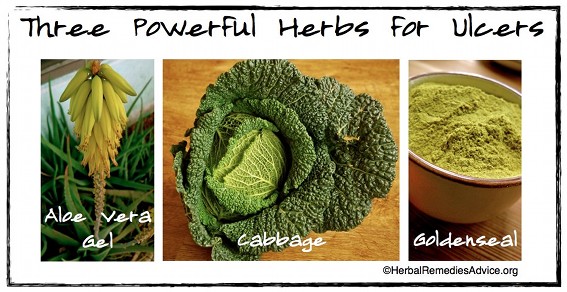Get weekly tips, recipes, and my Herbal Jumpstart e-course! Sign up for free today.

Peptic Ulcer
Share this! |
|
|
A peptic ulcer is essentially a wound found somewhere in the digestive tract. Millions of people in the United States suffer from stomach ulcers or duodenal ulcers. In this article we’ll look at the different kinds of ulcers, ulcer symptoms, a diet for ulcers, and what categories of herbs can be used as a natural ulcer remedy. |
What is a Gastric Ulcer vs. Peptic Ulcer vs. Duodenal Ulcer?
An peptic ulcer is essentially a wound that effects the mucous membranes of the digestive tract. Different names are given to ulcers depending on where they are located.
Gastric ulcers are located in the lining of the stomach.
Duodenal ulcers are located in the duodenum.
Oftentimes the term peptic ulcer is used to describe all digestive ulcers.
Ulcer Symptoms
As you might imagine (or have experienced!), ulcers are generally quite painful. The pain is described to be sharp, gnawing and/or burning. Depending on where the ulcer is located, the symptoms of an ulcer can vary.
Here are some other peptic ulcer symptoms and duodenal ulcer symptoms:
- Pain can be felt anywhere from the belly button to the breast bone. Sometimes it is felt in the back.
- The pain can last from a couple of minutes to several hours
- Certain foods (like bananas) can temporarily relieve ulcer pain
- Ulcer pain can be intermittent. It may go away and then return for a few days or weeks
- Typically a duodenal ulcer elicits more pain when the stomach is empty and is temporarily relieved when eating.
- Typically a peptic ulcer is worse during the night or when a person lays down.
Ulcers according to western medicine
Western medicine believes that digestive ulcers can be caused by a variety of symptoms including an H. pylori infection, improper diet (such as too much alcohol), pharmaceutical drugs (especially nsaid or non-steroidal anti-inflammatory drugs) and too much stomach acids.
Heliobacter pylori is a gram negative bacteria that causes an infection in the digestive tract. Interestingly, many people have an H. pylori infection yet they never develop symptoms or any type of ulcer. (This leads some practitioners to believe H. pylori is an opportunistic infection, not the underlying cause of an ulcer.)
Bleeding ulcer treatment
If someone is experiencing ulcer-like symptoms for the first time it is advised that they get it diagnosed by a doctor.
Ulcers can become very serious, especially if there is a bleeding ulcer. Ulcer symptoms accompanied by vomiting or dark to black stool are definitive signs that a person should seek immediate medical attention as they might have a bleeding ulcer. Bleeding ulcers are a medical emergency.
Stomach ulcer treatment
For many decades the standard of care for diagnosed ulcers was to prescribe pharmaceuticals such as PPIs which block acid production in the stomach. More currently doctors may also test for H. pylori and, if present, prescribe antibiotics as well.
Home Remedies for Stomach Ulcers
Digestive ulcers are another great example of the philosophical differences between western medicine and traditional herbal medicine. In traditional herbal medicine we assume that each person who has an ulcer has a different constitutional make up. In other words, not everyone should receive the same treatment because everyone is different. In herbal medicine there is no one specific herb or lifestyle choice that can be used as a natural ulcer remedy. Instead we need to fully evaluate the individual.
Does this person have an excess of stomach acids or a deficient amount of stomach acids? Is there systemic inflammation? Or is there overall weakness in tone? Is there a food intolerance as the underlying problem? The answers to these questions help to determine an appropriate natural ulcer remedy for the person and not the disease.
Many times in my clinical practice I see a lack of digestive enzymes to be the root cause of the ulcer. A lack of enzymes can create an imbalanced environment leading to a growth of H. pylori which can infect the mucous membranes. (In other words H. Pylori is a opportunistic infection, not the cause of the problem.)
Here is a look at the various categories of herbs that can be used as a natural ulcer remedy.
- Demulcent herbs help to coat and soothe the irritated mucous membranes. These can provide symptomatic relief quite quickly.
- Astringent herbs help to tighten and tone the mucous membranes to help heal the wound. They can also limit any infection.
- Antimicrobial herbs can address infections of the wound. In the case of a peptic or duodenal ulcer we want to choose herbs that are specific to heliobacter pylori such as goldenseal or garlic.
- Vulnerary herbs help to heal wounds.
- Bitter herbs help to stimulate digestive secretions (often a lack of digestive secretions is the underlying cause of the ulcer).
Lifestyle choices
Oftentimes it is the way we live our lives that contribute to our health imbalances. If alcohol consumption is causing the ulcer, then it is doubtful that any herb or natural ulcer remedy will help. First we need to remove the obstacle to cure. Here’s a list of common contributing factors to stomach ulcers. Any of these can also be considered a natural cure for ulcers!
- Avoid alcohol
- Avoid NSAIDs (non-steroidal anti-inflammatory drugs)
- Limit sugar and caffeine
- Chew food well
- Address food intolerances
- Promote weight loss to decrease abdominal pressure
Supplements
Digestive enzymes and/or HCL tablets may be temporarily used to increase digestive function. Be cautious in that they can also exacerbate the symptoms while there is an active ulcer.
Peptic Ulcer Diet and Duodenal Ulcer Diet
The foods you eat can both help to prevent ulcers and help to ameliorate ulcer symptoms.
For prevention you’ll want to consume foods that increase digestive function. Bitter greens as a salad and warming spices such as turmeric and garlic can be helpful. If there is systemic inflammation and heat, then focusing on eliminating and draining heat systemically will be a strong focus. Cooling foods, berries, and healthy fats should be emphasized while heating foods such as alcohol and excessive hot peppers should be eliminated.
To ameliorate ulcer symptoms some people find that eating a banana or drinking freshly juiced celery is helpful. It is very important not to simply mask the symptoms of an ulcer, but to get to the root cause and get rid of the ulcer!
Summary
Ulcers are a common, yet potentially serious wound, found in the mucus membranes of the digestive tract. Peptic ulcers and duodenal ulcers generally indicate an underlying health imbalance. Rather than simply taking pills in a one-size-fits-all manner of treatment, holistic herbal theory can help you determine the underlying cause. Understanding the root cause can help you discover the best natural ulcer remedy for you! And by addressing ulcers at the root of the problem you can more effectively find overall health.

Rosalee is an herbalist and author of the bestselling book Alchemy of Herbs: Transform Everyday Ingredients Into Foods & Remedies That Healand co-author of the bestselling book Wild Remedies: How to Forage Healing Foods and Craft Your Own Herbal Medicine. She's a registered herbalist with the American Herbalist Guild and has taught thousands of students through her online courses. Read about how Rosalee went from having a terminal illness to being a bestselling author in her full story here.

